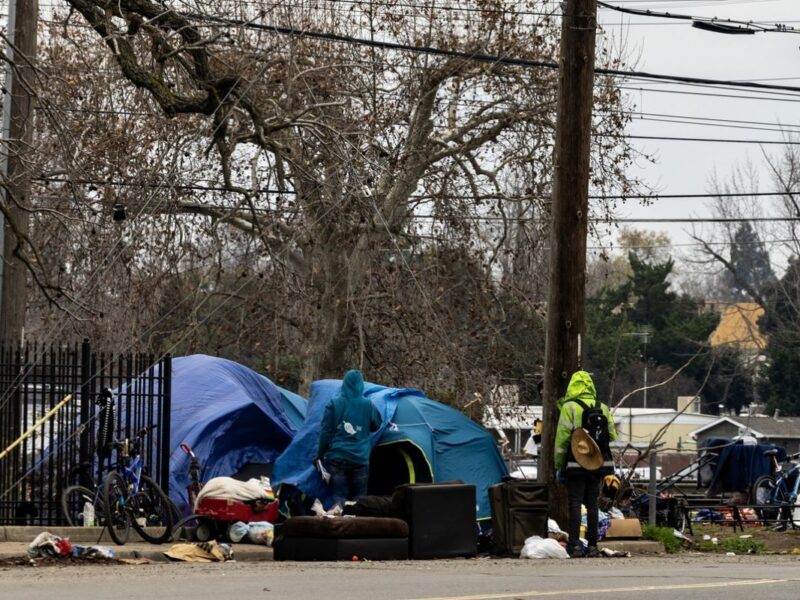Denver Mayor Mike Johnston claims that he achieved his goal of housing 1,000 people experiencing homelessness in 2023 through an initiative called House1000. Now, his administration aims to bring another 1,000 unsheltered people inside in 2024.
“It was a big initial lift, but the work is just beginning,” Cole Chandler, who serves as Johnston’s senior advisor on homelessness solutions, told The Colorado Sun.
Part of the initial success of House1000 was Johnston’s aggressive push to open new shelter sites, Chandler added. Denver acquired three hotels to convert into about 500 shelter units and is leasing another hotel as a navigation center for its House1000 program. Johnston also pushed to open so-called micro-communities of pallet shelters across the city.
But a lot of this work is going to be set aside as the city plans to move people in the House1000 program into more stable housing through rapid rehousing, Chandler added. Rapid rehousing refers to giving someone a home quickly without crossing barriers like having a job or a clean criminal record.
So far, about 300 people who have entered the House1000 program have been placed in stable housing. That represents about 30% of the people who have entered the program thus far.
As people enter supportive housing options, new House1000 participants will backfill the units made available through the moves, Chandler said.
The efforts come at a time when Denver is trying to balance its response to the twin crises of homelessness and an increasing number of migrants from South America arriving in the city on an almost daily basis. The latest point-in-time count shows that there are more than 5,800 people experiencing homelessness in Denver and another 30,000 people who accessed homeless services last year.
Denver spent approximately $45 million in 2023 for its House1000 program.
The city has also spent about $50 million to provide shelter and services for the nearly 35,000 migrants who have arrived over the last 12 months. Johnston has said the total spent on migrants could increase to $180 million in 2024 and has asked city agencies to start considering where they can cut funding from their budgets to support the efforts.
“We know we both want to be a welcoming and supportive place where people are not going to be without services and support, and we also want to fund critical services all across the city to make sure everyone has access to the services they need,” Johnston said January 9, during his weekly update on the migrant crisis.
Providing housing for another 1,000 people experiencing unsheltered homelessness in Denver is no small task. During a city council briefing on January 25, Chandler said this year’s efforts would include more “encampment decommissions,” a term the Johnston administration refers to homeless sweeps. Last year, the city decommissioned ten encampments, Chandler said.
“There had never before been successful encampment resolutions in this city,” he said during the briefing. “We’ve never been able to go into a camp and offer everyone in that camp an indoor option.”
Another part of Denver’s 2024 rehousing efforts is to connect people with physical and behavioral services and disburse the nearly 500 new housing vouchers the city has received, Chandler added.
However, there are still concerns about transparency and whether Denver is giving the public accurate data.
The House1000 program has been previously criticized for publishing misleading data about its successes and not prioritizing housing placements for people already in Denver’s shelter system. Neighborhood organizations have also pushed back against Johnston’s micro-community initiatives.
During the city council briefing on January 25, councilmember Kevin Flynn noted that it is getting more difficult to separate the migrant and unhoused populations in Denver. Many migrants are already living on Denver’s streets because the city limits how much time a migrant family can spend in a shelter, he added.
Chandler acknowledged the challenging landscape Denver faces and said the two issues could come to a head if both groups don’t get the necessary services they require.
“It’s obviously a real challenge… If inflow continues and if we can’t serve people that come to our community in an effective way, they are going to wind up in encampments on the street,” Chandler told Denverite. “If we can’t prevent new migrant encampments from popping up, we’re going to be in a really tough situation.”
How You Can Help
Now is not the time to be silent about homelessness in Colorado or anywhere else. Unhoused people deserve safe and sanitary housing just as much as those who can afford rent or mortgage.
Poverty and homelessness are both policy choices, not personal failures. That’s why we need you to contact your officials and tell them you support legislation that:
- Streamlines the development of affordable housing
- Reduces barriers for people experiencing homelessness to enter permanent housing
- Bolsters government response to homelessness
Together, we can end homelessness.













